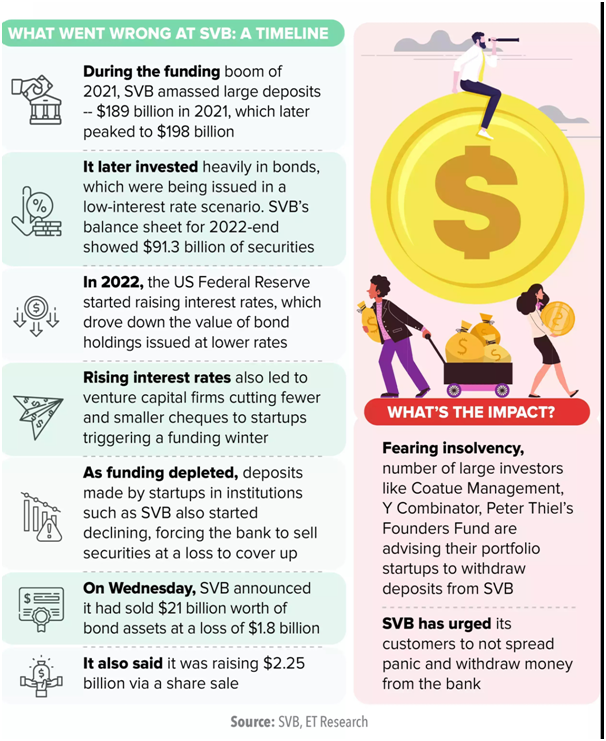Silicon Valley Bank’s Collapse
Context: Recently European bank stocks fell sharply with embattled Credit Suisse tumbling to a new low, on renewed investor concerns about stresses within the sector triggered by Silicon Valley Bank’s sudden collapse.
What’s happening in the US?
- In the United States, regional and large banks fell in the premarket. First Republic Bank was flat, with peers Western Alliance Bancorp and PacWest Bancorp down 2% and 12%, respectively.
- Big banks including JP Morgan Chase, Citigroup and Bank of America were all hit, by between 2% and 4%.
- BlackRock Chief Executive Laurence Fink warned that the S. regional banking sector remains at risk, and predicted further high inflation and rate increases.
- Fink described the financial situation as the “price of easy money” and said in an annual letter that he expected more U.S. Federal Reserve interest rate increases.
- He said that after the regional banking crisis, “liquidity mismatches” could follow because low rates have driven some asset owners to raise their exposure to higher-yielding investments that are not easy to sell.
What are the concerns now?
- Rapid rises in interest rates have made it harder for some businesses to pay back or service loans, increasing the chances of losses for lenders who are also worried about a recession.
- However, European Central Bank policymakers are still leaning towards a half-percentage-point rate hike as they expect inflation will remain high.
- Investors had begun to doubt the ECB’s commitment to another big rate hike as SVB’s collapse rattled markets. But the source said the central bank was unlikely to diverge from its plan to raise rates by 50 basis points on Thursday because doing so would damage its credibility.
- In the United States, the focus is shifting to the possibility of tighter regulation of banks, particularly mid-tier ones like SVB and New York-based Signature Bank, whose collapses triggered the market tumult.
- Moody’s Investors Service revised its outlook on the U.S. banking system to “negative” from “stable”, citing heightened risks for the sector.
- SVB’s shutdown forced President Joe Biden to rush out assurances that the U.S. financial system is safe and prompted emergency measures giving banks access to more funding. And in an attempt to avert a similar crisis down the line, the U.S. Federal Reserve is considering tougher rules and oversight for midsize banks similar in size to SVB.
- Earlier, the Tokyo Stock Exchange banks index jumped more than 4%, after three straight days of heavy selling.
- Investors had been particularly concerned about the huge bond holdings of Japan’s lenders, but Japanese finance minister Shunichi Suzuki said differences in the structure of deposits meant local banks would not face incidents similar to SVB.
Aftermath of the Silicon Valley Bank collapse
- In Britain, HSBC’s top bosses have called on employees at SVB’s rescued UK arm to assure clients “their deposits are safe and loans are supported” as the process of integration following its takeover begins, a memo from the bank showed.
- Charles Schwab Chief Executive Walt Bettinger said that the bank has ample liquidity and is not currently seeking capital or deals. The firm had seen an influx of $4 billion in assets to its parent company as clients moved assets to Schwab from other firms.
| Practice Question
1. What are the possible impact of Silicon Valley collapse on the world economy? |




